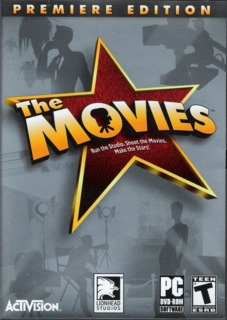Molyneux tries for too much with "The Movies". If anything, it's a great movie making tool.
Molyneux offers players a chance to run their own Hollywood studio from the 1920s to the present and create movies through an ingenious 3D movie-creating tool. Being the owner of a Hollywood studio may sound intriguing and possibly highly entertaining, but it ultimately becomes one of the most horrific professions known to mankind. “The Movies” is combination of “Roller Coaster Tycoon” and “The Sims”, a mixture that may seem like the best of both worlds, but simply translates into far too much management. Players build sets, hire staff (actors, crew, directors, script writers, janitors and researchers), manage production and filming of movies and furnish the studio lot to please staff members. These are all quite standard duties that would be expected of a studio owner, but unlike most reputable strategy games, Molyneux demands far more.
Each actor and director has emotions, needs, and wants that can drive an owner to madness when the only goal is to complete the filming of a movie. The general flow of gameplay in the game involves creating a script (either through a dense movie creation tool or a randomly generated version), casting the crew, actors, and directors, and finally following its progress in the brutal war zone known as the box office. “The Movies” expects a player to be able to have two to three films being filmed at one time in order to stay on the charts. All the while, players are expected to make sure that each of their actors and directors have not wandered off of their sets to get drunk or fill their faces with food. Each actor and director can become jealous of each other and will demand trailers, entourages, and makeovers or else they will hit the bricks and leave your film without a star. Amidst the chaos of inebriated stars whose moods ruin your movies, “The Movies” also expects that players manage each and every set and building, including bathrooms, and make sure their maintenance level is always sufficient. Suddenly, the original “standard” duties that were expected are hidden behind the myriad of duties required to make a single staff member satisfied.
Failing to keep up with any time consuming duty could mean the demise of one of your movies. Each star must be satisfied before each and every scene otherwise your movie will lose a severe amount of quality points. When you have three directors meandering about in a drunken stage of bliss, actors hiding in their trailers, and a debt equivalent to the inverse of Ross Perot’s bank account, frustration becomes your best friend and only ally when playing “The Movies.”
Obviously, the expectations of players in the normal mode of “The Movies” can be quite challenging to keep up with and will easily scare casual gamers away (not to mention hardcore gamers that lack any patience). “The Movies” does, however, offer an alternative mode where actors and directors have no emotions and therefore never bother you, sets can be built instantly, movies can be filmed and produced instantly and an entire studio can be created and furnished the moment you begin the game. This allows players to dive into the most entertaining features of the game and ignore the drudgery of living in Hollywood. With the majority of the strategy stripped away from the game, one must wonder just how much value is left to enjoy when your main goal is to finally only make movies.
“The Movies” has a movie-creating tool that is not only unique and original, but quite possibly one of the most enjoyable and addicting experiences a gamer can have. You can create ridiculously non sequitur short movies or spend hours on an extensive epic about aliens breaking out of prison. The types of scenes, sets, and animations that are available seem endless at first, but can become a bit restrictive after many hours of play. The tool allows you to add your own voice acting to the characters and can even lip-synch the mouths to any voice. You can edit the film with about as many options as Windows Movie Maker and eventually export it to a format that can be uploaded online to the “The Movies” website. You can then share your ridiculous movies with other most likely insane directors in an already growing community. Using the movie-creating tool is not a requirement for each movie (you can hire a writer to write randomly generated movies), but it is certainly the source of entertainment in “The Movies.” The most valued feature of “The Movies” is its movie-creating tool and, in my opinion, the tool alone is worth the $50 price tag.
Molyneux wants to please the casual gamer with each release he makes, but he is continually forgetting to act like one. While “The Movies” is able to create a user-friendly interface and generally enjoyable environment to interact with, Molyneux is completely oblivious to the fact that the strategy implemented is simply too overwhelming and time consuming. The alternate mode of the game is lacking in any real challenge and contains many of the flaws from the normal mode. Each feature, even the most miniscule, is worth noting and praising, but when combined altogether, “The Movies” becomes a job rather than a gratifying experience. “The Movies” can supply several hours of indulging Hollywood satisfaction that can be shared with friends, but it is up to the gamer as to whether this alone is enough to throw down the $50 for.
After many hours spent tossing actors around a studio and creating beautiful masterpieces starring 50 Cent, I feel I’ve had a worthwhile experience with “The Movies” that any type of gamer can also appreciate. However, I fear the apparent open-ended gameplay offered in “The Movies” lacks enough value and variety to make it a long-lasting title in any gamer’s collection.

